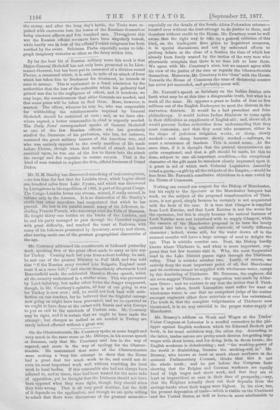On the Obstructionists, Mr. Courtney spoke at some length and
very much in the same sense as Mr. Dillwyn, in his recent speech at Swansea, only that Mr. Courtney said less in the way of reproof, and more in the way of apology for the Obstruc- tionists. He maintained that some of the Obstructionists were making a 'very fair attempt to show that the House had a great deal too much work to do, and could not do even its most important work well without remitting the local work to local bodies. If this reasonable aim had not always been adhered to, and at times, time had been wasted for the mere sake of opposition, yet he thought that the Irishmen should not have been opposed when they were right, though they should when they were wrong. That is all very good doctrine, but the drift of it depends on the application, and though we are quite willing to admit that there were discussions of the greatest moment—
especially on the details of the South-Africa Federation scheme— hurried over without the least attempt to do justice to them, and therefore without credit to the House, Mr. Courtney must be well aware that the right way to take up a general criticism of this kind, on the inadequate time given to important measures, is in special discussions, and not by reiterated efforts to prolong debate at the close of a Session the time of which has already been freely wasted by the tactics of the very men who afterwards complain that there is no time left to hear them. We agree with Mr. Courtney's aims, but we cannot agree with his view of the justice of the case as regards the Obstructionists themselves. Moreover, Mr. Courtney is too 'dour' with the House. Towards the House of Commons the tone of dictatorial censure has never yet succeeded, and probably never will.






























 Previous page
Previous page